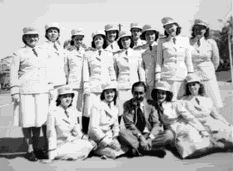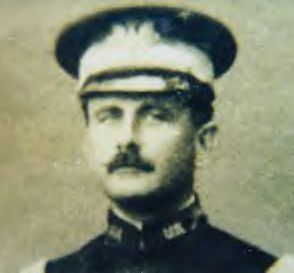Related Research Articles

Brigadier General Antonio Rodríguez Balinas was the first commander of the Office of the First U.S. Army Deputy Command.

Major General Luis Raul Esteves was the first Puerto Rican and the first American citizen of Hispanic heritage to graduate from the United States Military Academy, and the founder of the Puerto Rico National Guard. Of his West Point class, that included Dwight Eisenhower, Omar Bradley, Joseph McNarney, James Van Fleet and George E. Stratemeyer, Esteves was the first to achieve the rank of general.

Eugenio María de Hostos y de Bonilla, known as El Gran Ciudadano de las Américas, was a Puerto Rican educator, philosopher, intellectual, lawyer, sociologist, novelist, and Puerto Rican independence advocate.

Sergeant First Class Modesto Cartagena de Jesús was a member of the United States Army who served in the 65th Infantry Regiment, a military regiment consisting of Puerto Rican enlisted soldiers and officers from the continental United States also known as "The Borinqueneers," during World War II and the Korean War, becoming the most decorated Hispanic soldier in that war. He was the most decorated Puerto Rican soldier in history.

The recorded military history of Puerto Rico encompasses the period from the 16th century, when Spanish conquistadores battled native Taínos in the rebellion of 1511, to the present employment of Puerto Ricans in the United States Armed Forces in the military campaigns in Afghanistan and Iraq.
Dr. Antonio S. Pedreira, was a Puerto Rican writer and educator.

Lieutenant Colonel Teófilo Marxuach,, was the person who ordered the first shots fired in World War I on behalf of the United States on a German cargo liner trying to leave San Juan Bay without permission. Marxuach ordered shots from a machine gun, and from a gun in the Santa Rosa battery of the Castillo San Felipe del Morro, in what are considered to be the first shots of World War I fired by the regular armed forces of the United States against any ship of the Central Powers, forcing Odenwald to stop and to return to port.
Angelo Falcón was a Puerto Rican political scientist best known for starting the Institute for Puerto Rican Policy (IPR) in New York City in the early 1980s, a nonprofit and nonpartisan policy center that focuses on Latino issues in the United States. It is now known as the National Institute for Latino Policy and Falcón served as its president until his death. He was also an Adjunct Assistant Professor at the Columbia University School of Public and International Affairs (S.I.P.A.).

Major Fernando E. Rodríguez Vargas, DDS was an odontologist (dentist), scientist and a Major in the U.S. Army who discovered the bacteria which causes dental caries.

Puerto Ricans have served as members of the United States Armed Forces and have fought in every major conflict in which the United States has been involved from World War I onward. Many Puerto Ricans, including those of Puerto Rican descent, have distinguished themselves during combat as members of the five branches of the U.S. Military, the Army, Marines, Navy, Air Force and the Coast Guard.

Puerto Ricans and people of Puerto Rican descent have participated as members of the United States Armed Forces in the American Civil War and in every conflict which the United States has been involved since World War I. In World War II, more than 65,000 Puerto Rican service members served in the war effort, including the guarding of U.S. military installations in the Caribbean and combat operations in the European and Pacific theatres.

Luis Ernesto González Vales was a Puerto Rican historian. He held the post of Official Historian of Puerto Rico, having succeeded Pilar Barbosa.
Colonel Gilberto José Marxuach a.k.a. "The Father of the San Juan Civil Defense", was a former officer in the United States Army who in 1951 founded and became the first director of the Civil Defense in the City of San Juan, Puerto Rico.
Puerto Ricans and people of Puerto Rican descent have participated as members of the United States Armed Forces in every conflict in which the United States has been involved since World War I.
Commencing with World War I, Puerto Ricans and people of Puerto Rican descent have participated as members of the United States Armed Forces in every conflict in which the United States has been involved. Accordingly, thousands of Puerto Ricans served in the Armed Forces of the United States during the Vietnam War, also known as the Second Indochina War. Hundreds of them died, either killed in action (KIA) or while prisoners of war (POW). The Vietnam War started as a Cold War, and escalated into a military conflict that spread to Vietnam, Laos, and Cambodia from 1959 to April 30, 1975.

Clarence Ollson Senior (1903–1974) was an American socialist political activist best remembered as the National Executive Secretary of the Socialist Party of America during the 1930s. Originally a protégé of presidential candidate Norman Thomas, during the inner-party fight of the 1930s, Senior became an active supporter of the so-called "Militant" faction. After resigning his post late in 1936, Senior returned to graduate school, becoming a widely published academic specializing on the affairs of Puerto Rico and other nations of the Caribbean.

The 65th Infantry Regiment, nicknamed "The Borinqueneers" during the Korean War for the original Arawak Indian name for Puerto Rico (Borinquen), is a Puerto Rican regiment of the United States Army. The regiment's motto is Honor et Fidelitas, Latin for Honor and Fidelity. The Army Appropriation Bill created by an act of Congress on 2 March 1899 authorized the creation of the first body of native troops in Puerto Rico. On 30 June 1901, the "Porto Rico Provisional Regiment of Infantry" was organized. On 1 July 1908, Congress incorporated the regiment into the Regular Army as the Puerto Rico Regiment of Infantry, United States Army. On 14 May 1917, the regiment was activated and additional men were assigned, with the unit being sent to serve at Panama. On 4 June 1920, the regiment was renamed 65th Infantry. During World War II, the regiment saw action throughout Europe, especially France and Germany, participating in Naples-Foggia, Rome-Arno and Rhin. Several Purple Hearts were awarded posthumously to members of the 65th Regiment.
Gloria Bonilla-Santiago is a Board of Governors Distinguished Service Professor at the Department of Public Policy and Administration and Director of the Center for Strategic Urban Community Leadership at Rutgers University–Camden. She is also the founder of Leadership, Education, and Partnership (LEAP) Academy University Charter School located in Camden, New Jersey. Created in 1997, LEAP is one of the 17 inaugural public charter schools in New Jersey. As the founder of LEAP, Bonilla-Santiago created a merit pay/pay-for-performance program designed to reward excellence in teaching and improve student academic outcomes.

Félix V. Matos Rodríguez is a Puerto Rican academic administrator, currently the eighth Chancellor of The City University of New York (CUNY), the largest urban public university system in the United States. A historian, professor, author and noted Puerto Rican scholar, Matos Rodríguez previously served as president of two CUNY colleges and as a cabinet secretary of the Puerto Rico Department of Family Affairs. He assumed the post of Chancellor of CUNY on May 1, 2019, becoming the first Hispanic to lead the university.
References
- 1 2 3 4 Hevesi, Dennis (7 January 2011). "Frank Bonilla, Scholar of Puerto Rican Studies, Dies at 85". The New York Times . Retrieved 12 November 2018.
- 1 2 3 4 5 "Frank Bonilla became major figure in Puerto Rican studies". US Latinos and Latinas & World War II. University of Texas. Archived from the original on 2006-09-01. Retrieved 2007-05-17.
- ↑ Behavioral Sciences and the National Security: Report No. 4, Together With Part IX of the Hearings on Winning the Cold War: The U.S. Ideological Offensive by the Subcommittee on International Organizations and Movements of the Committee on Foreign Affairs, House of Representatives, December 6, 1965
- ↑ "UC Davis NAS Professor receives Frank Bonilla Public Intellectual Award". www.nas.ucdavis.edu. UC Davis. Retrieved 12 November 2018.[ permanent dead link ]